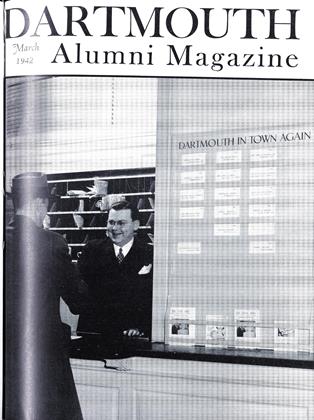MR. WINANT AND MR. EDEN put in a splendid appearance, and the band played The Star-Spangled Banner while we stood straighter than we ever stood before. They had the five of us out front instructing our squads on Lesson 18; Rifle (the rapid fire is used only in case of emergency and is blah blah) while the great men walked around after the ceremonial and the march-past. Many reporters and photographers and minor generals followed them. We were newsreeled by Fox, and Durk and I interviewed by the BBC in a recording. The Times and the others all had a story of some kind, one paper had a 3-column cut, and the Sunday Times won the medal with a story which said "Watching five young lance-corporals give instruction in rifle and automatic weapons," the Ambassador was struck by a familiar accent. "They are countrymen of yours" he was told. This about Winant who had nearly winked out loud at us. Apparently the newsreel and radio stuff was used—one of our friends said: "All I could see was your moustache." Anyway we had drinks afterwards at the officers' mess where Winant was his gracious intent self, and Eden as boyish and charming as reported. Sir John Davidson said he had good reports of us and confirmed that we would have only four months at OCTU and then straight East—or indeed straight wherever we wanted. Mr. Winant insisted we stay in his flat over the week-end so Durk and Cox went there, I to the Dorchester, Heyward to the ducks and geese of Norfolk, and Jack Brister—hold tight—to Lady Astor at Cliveden. He had a fine time and met parcels of influential writers and publishers.
After a pleasant week-end Cox and I packed off for Kilgobbin the desmesne of the Vixcount Adare in Country Limerick. An arduous journey it was we made of it, two whole days together, over many flat fields in a carriage drawn by a horse all graved of metal, and thence from a mountainous seaport cross the shining wintry Irish sea to the ancient lands of Brian Boru, Fiann, Clon, Art MacClon and the earlier gods and bards. In Oun Looghaire the streets were lit with flame and not darkened from the bombers, and we were carried up from thence to the jeweled city of Dublin, girt round by milk and beef-steaks.
After we had lain that night in a notable caravanserai yclept the Grand Hotel (bed and breakfast 6 and 6) we went on together one whole day into the south, on another carriage drawn by a graved horse, but illfed. "Faith, we've no fuel but ashes and twigs" cried a native conductor. Nine whole hours together it took us to traverse 113 miles; I myself was there and saw them in their attempts to feed and pacify the iron horse, who would run full valiantly for ten minutes and then die until he had been rested and refreshed. From Limerick on Shannon's mossy side we went swiftly in a Ford chariot to the fair demesne of my Lord Adare; where things got less medieval. He's surely a squire, with a thousand acres and a hundred horses and 300 bullocks; the titles, the "me lads" and "sirs," the hot water bottles in your bed, the clothes laid out neatly and justly, the variety and richness of the food and drink, the style and pleasure of it, were certainly medieval, more than Oriental in their splendor. But Kilgobbin is a comparatively small and completely friendly house, Dicky Adare a most affable and outrageously comical gentleman, and his wife, Nancy Yuill that was, one of the most charming women I ever met. She was brought up in North Ca'lina and New York, and her sisters married Carroll Carstairs, Wolcott Blair and Harry Payne Bingham.
For the snipe-shoot we lined the windward side of a bog while the beaters and a handsome pack of Labradors came through. The bogs were not wet enough so we only bagged 25 birds among 6 guns. Lofty and I got 3 apiece, such sport I never had.
The trip home was the roughest sea I ever saw, nearly everyone was sick, and it was wet; and the trains were all late; and we only got back this afternoon; and now I've at and drunk and made merry and I'm ready to go quietly, officer, dammit.
 View Full Issue
View Full Issue
More From This Issue
-
 Article
ArticleTrials, Tribulations, Success
March 1942 By RALPH SANBORN '17 -
 Sports
SportsBig Green Teams
March 1942 -
 Class Notes
Class Notes1917*
March 1942 By EUGENE D. TOWLER -
 Class Notes
Class Notes1937*
March 1942 By DONALD C. MCKINLAY -
 Article
ArticleIndians Scout for the Fleet
March 1942 By LT. E. F. PLANK, UNITED STATES NAVAL RESERVE -
 Class Notes
Class Notes1931*
March 1942 By CHARLES S. MCALLISTER









